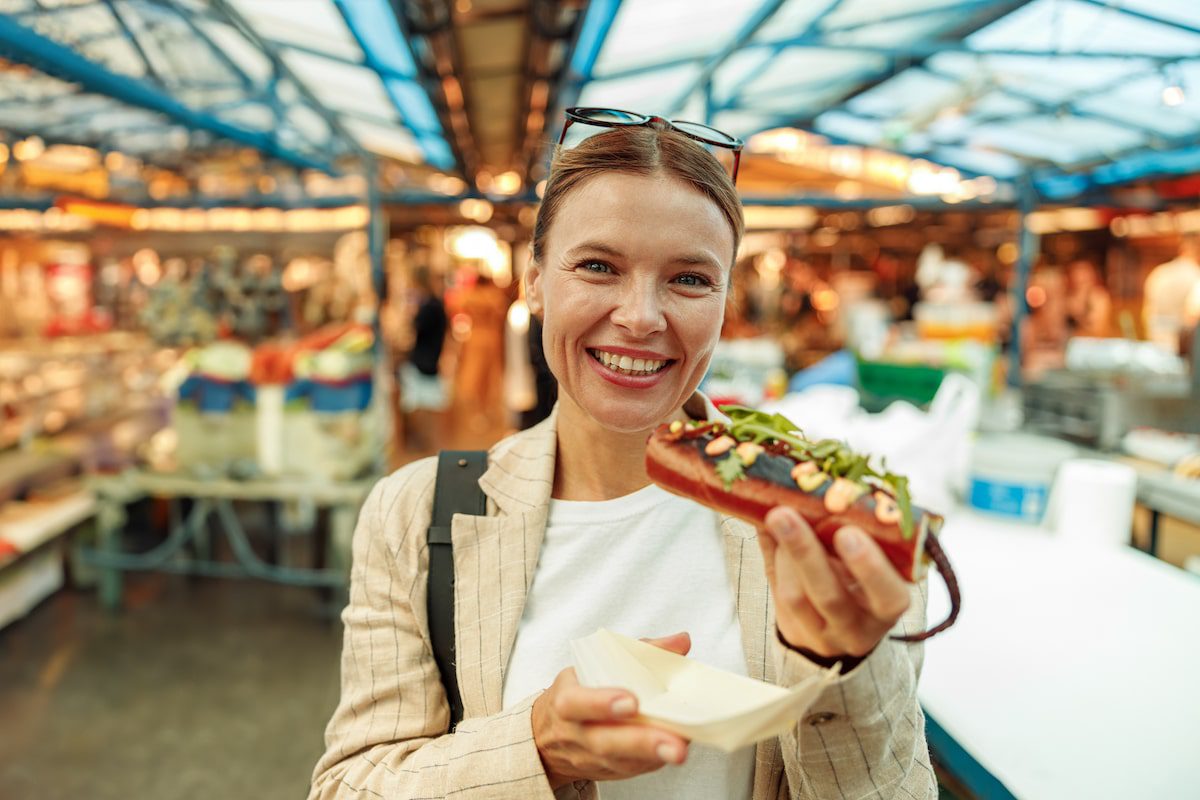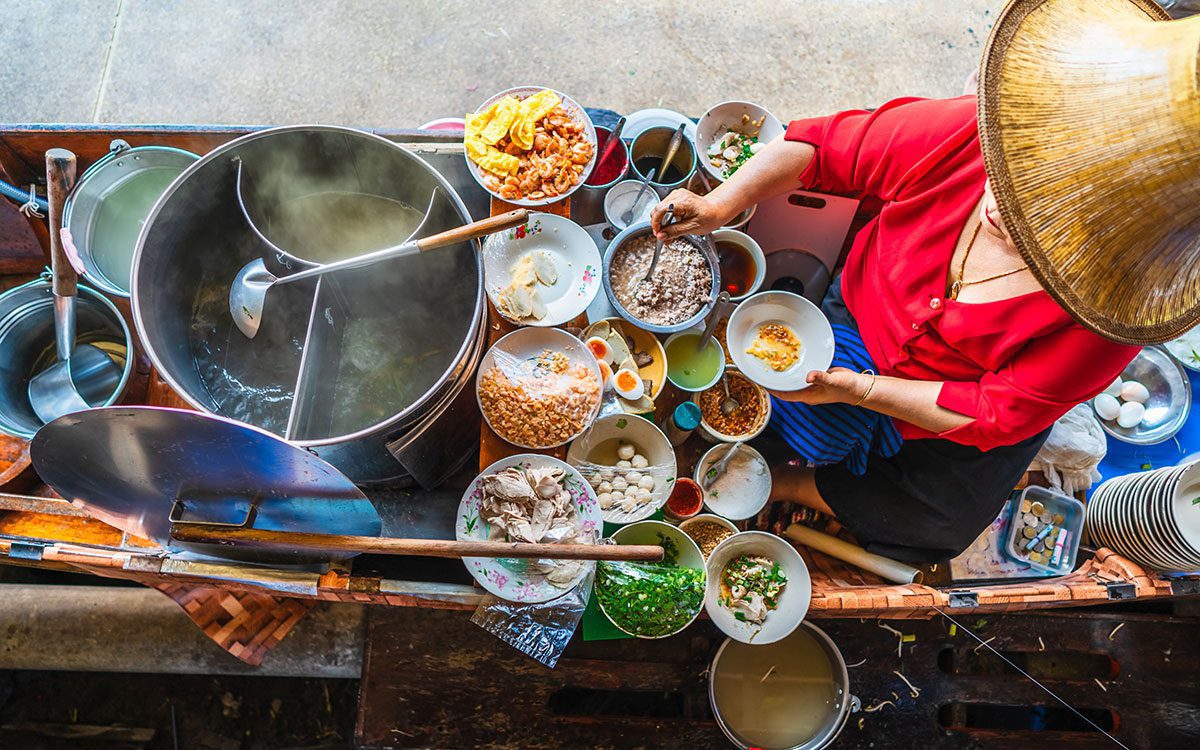Last updated on August 2nd, 2024
What and how to eat on the road to avoid getting sick
by Jodi Ettenberg
How can you eat street food without getting sick? The seven tips below are not guarantees and even the most iron cast stomachs can be felled by a food misadventure. It is part and parcel of the risk inherent in travelling.
Editor’s note: We invited Jodi Ettenberg, a lawyer, an avid traveller and the brains behind the website legalnomads.com to share her best street food tips. As a celiac who traveled, food is an important part of her days. She needs to know what to eat, and what to avoid so that she does not become ill. Through the lens of mealtimes, Jodi is able to learn so much more about a place and its people. She has also discovered a deep abiding love of soup and street food.
1. Check out the length of the lineups
Everyone tells you to eat at the stalls with the longest line of locals. This is still good advice! But I always add that it’s important to look at who is in line. I know my stomach is potentially less resilient than that of a taxi driver who is used to quick street meals, so I try to opt for street stalls with both women and children in line.
More variety in the customer base usually means the stall has been vetted enough that it’s safe for everyone. Yes, it’s still better to choose a long lineup of men over an empty stall, but given the choice, women and children in line is where you want to go.
2. Go back to school at lunchtime…
For a cheap lunch, go to the local university and find a place nearby to eat. Students are a hungry bunch, and often some of the fun variations of east meets west pop up here. In Saigon, “pho burgers” were present but so were cheap stalls that served local favorites to a rotating cast of students. It won’t be the best meal of your life, but it will be local, fast, cheap, and usually delicious. Not recommended for dinnertime, however, as the meals will have sat out for the afternoon.
3. Transparent kitchen
I feel like I have more control with a street stall because I can see how the food and the money is handled. If someone is touching the money and then the raw ingredients, I don’t eat there. If there are plastic gloves for the food-making and then they are kept on for handling money? Same – it’s a miss. For two-party stalls often one person will be in charge of the cash and cooking, and the other preparation. This is a good bet, since they are kept separate.
Basically, avail yourself of your senses when choosing where to eat.
That’s not to say that I avoid restaurants entirely! But where there is a culture of street food (like Mexico City or Saigon or Bangkok) I will usually eat all of my meals on the street.
4. Cutlery as culprit…
I feel like I have more control with a street stall because I can see how the food and the money is handled. If someone is touching the money and then the raw ingredients, I don’t eat there. If there are plastic gloves for the food-making and then they are kept on for handling money? Same – it’s a miss. For two-party stalls often one person will be in charge of the cash and cooking, and the other preparation. This is a good bet, since they are kept separate.
Basically, avail yourself of your senses when choosing where to eat.
That’s not to say that I avoid restaurants entirely! But where there is a culture of street food (like Mexico City or Saigon or Bangkok) I will usually eat all of my meals on the street.

5. Morning markets to start the day…
When readers write about where to start with street food, I always suggest they head to a busy local produce market. Be it the many morning food markets in Mexico City, or on a side trip to a small village – if it has a produce market, it usually has some freshly cooked food. Because these stalls are set up to feed the hungry shoppers, there is quick turnover. I’ve found that a way to experience a daunting new food spectrum is to start at these markets and try the foods one by one.
Many people opt for hotels with breakfasts included, or for a more Western breakfast of yoghurt and fruit. While that may be an option, I opt for dining at a market instead. If you love the food you try, you can ask the vendor where they are during the day, or if they don’t serve that food elsewhere, where they would suggest you try it instead.
All in all, markets are an excellent way to kickstart your tastebuds and all of your other senses.
6. What time do locals eat? That’s when you want to be eating…
One of the pieces of advice I give to tourists, especially European ones who eat a bit later than North Americans, is to try to mimic the local food times for their meals. I realize that 6pm dinners or 11am lunches don’t fit the usual meal patterns for most, but it can be very helpful for your stomach if that’s when locals eat.
This is especially important when dishes are cooked and set out buffet style, as you’d want to eat them when they are fresh and before bacteria can form as the food cools. For me, this means shifting my meal times somewhat but it is worth it because the food is piping hot, newly cooked, and doesn’t get me sick.
7. Peel your fruit or don’t eat it …
Unless you are used to a new place and its bacteria, I would only eat peelable fruit. Bananas, papaya, mango, rambutan, mangosteen and more — there is no shortage of delicious fruit that has a peel, and your stomach will thank you. Avoid lettuce, or fruit with the skin you eat (like apples). Strawberries, while tempting, ought to be avoided in countries with high pollution and a questionable water system.
Be safe, not sorry. Safe journeys everybody!
EDITOR’S NOTE: Are you gluten-free and worried about eating safely on the road? Food writer and celiac Jodi Ettenberg has created detailed gluten-free translation cards that you can download directly to your phone and show to restaurants when eating out around the world. 10 countries so far, including Japan, Italy, Greece, Mexico, and more. Check them out here.
More on Food
Satisfying My Sweet Tooth on a Culinary Tour Through Paris and Strasbourg
A culinary tour in Paris mixes chocolate, fashion, shopping, and a bestselling author together for the perfect Christmas adventure.
Alcohol-Free Travel: A Different (and Healthier) Kind of Journey
With the growth of de-alcoholized beers, mocktails and sparkling wine, there’s never been a better to time to try alcohol-free travel.
The Black Fly in Our Chardonnay: Booze Around the World
Jules Torti and her wife Kim have been on countless adventures in search of booze around the world, from moonshine to craft beers and more!







0 Comments
We always strive to use real photos from our own adventures, provided by the guest writer or from our personal travels. However, in some cases, due to photo quality, we must use stock photography. If you have any questions about the photography please let us know.
Disclaimer: We are so happy that you are checking out this page right now! We only recommend things that are suggested by our community, or through our own experience, that we believe will be helpful and practical for you. Some of our pages contain links, which means we’re part of an affiliate program for the product being mentioned. Should you decide to purchase a product using a link from on our site, JourneyWoman may earn a small commission from the retailer, which helps us maintain our beautiful website. JourneyWoman is an Amazon Associate and earns from qualifying purchases. Thank you!
We want to hear what you think about this article, and we welcome any updates or changes to improve it. You can comment below, or send an email to us at [email protected].